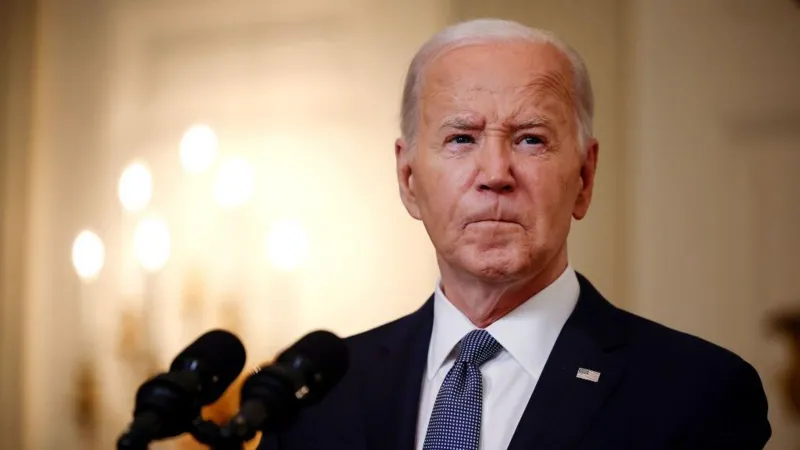Biden reveals Israeli plan to end Israel-Gaza conflict
Bernd Debusmann Jr & Tom Bateman
01/06/2024
Bernd Debusmann Jr & Tom Bateman , BBC News, Washington
US President Joe Biden urged Hamas on Monday to accept a new Israeli plan to end the conflict, saying “it is time to put an end to this war”.
The first part of the three-part plan would be a six-week-long ceasefire during which Israel Defense Forces would withdraw from Gaza’s populated areas.
A “surge” in humanitarian aid would be provided, along with an exchange of hostages for Palestinian prisoners.
This deal would lead to a permanent cessation of hostilities and a major rebuilding plan for Gaza.
Hamas has said that it sees the proposal as “positive”.
Biden, speaking at the White House Friday, said that the plan’s first phase would include “a full and complete ceasefire”, a withdrawal of IDF troops from populated areas, and an exchange of Palestinian prisoners for hostages.
He said, “This is a truly decisive moment.” “Hamas wants a truce. This is a chance to see if they mean it.
He added that the ceasefire would enable more humanitarian aid, “600 trucks bringing aid into Gaza each day”, to reach Gaza.
In the second phase, all living hostages would be returned including male soldiers. The ceasefire will then be “the permanent cessation” of hostilities.
David Cameron, the UK Foreign Secretary, said on X: “Hamas must accept this deal in order to see an end to the fighting.”
Lord Cameron said: “We have long argued that a stop to the fighting could be transformed into a lasting peace if all of us are prepared to take the correct steps.” “Let’s take this opportunity to end this conflict.”
UN Secretary General Antonio Guterres welcomed the developments in a tweet to X (formerly Twitter). He said that the world has “seen too much suffering and destruction in Gaza”, adding that it is “time to stop”.
He added: “I welcome President Biden’s initiative and encourage all parties [to] seize this chance for a ceasefire. I also urge them to take advantage of the opportunity in order to guarantee unhindered access by humanitarian agencies, and a lasting peace throughout the Middle East.”
In his speech, Biden acknowledged the difficulty of negotiations between phases 1 and 2.
Benjamin Netanyahu, the Israeli prime minister, made it clear a few weeks ago that he would not agree to a ceasefire agreement to end the conflict. This makes Mr Biden’s mention of the end of the war all the more significant.
The US call for a ceasefire appears to be an important concession to draw Hamas to the table to negotiate on terms that they had already agreed to. The group has made a permanent ceasefire one of its key demands.
In the third phase, the proposal calls for the return of any dead Israeli hostages, and a “major rebuilding plan” that includes US and international aid to rebuild schools, homes and hospitals.
In his remarks, Biden acknowledged that certain Israelis, including officials in Israel’s government, would probably be against the proposal.
He said, “I have urged the leaders in Israel to support this deal.” “Regardless of what [political] press comes.”
The US President also addressed directly the Israeli people telling them “we cannot lose this moment”.
Biden noted that Hamas had been so degraded that its fighters could no longer carry out an attack like the one they carried out on 7th October. This is a signal to Israel that Washington believes the war to be over.
In a press release, Prime Minister Netanyahu emphasized that the war will not end until all of its objectives are achieved, which include the return of the hostages, and the destruction of Hamas’ military and governance capabilities. He said that the new plan will allow Israel to maintain these principles.
Hamas for its part said it views the proposed “positively”, because its calls for a ceasefire permanent, the withdrawal by Israel of forces from Gaza and reconstruction, as well as the exchange of prisoners.
The group stated that it would “deal positively and constructively” with any proposals centered on a ceasefire permanent, as long as Israel “declares their explicit commitment to this”.
A Palestinian official who is familiar with the talks and has seen the Israeli proposal stated that it did not guarantee the end of the war or the withdrawal of IDF troops from Gaza.
Hamas has received the proposal through mediators in Qatar.
US Secretary of state Antony Blinken also called his counterparts from Jordan, Saudi Arabia, and Turkey in an effort to gain a broader support for the plan.
Matthew Miller, a spokesman for the State Department said that Mr Blinken had “emphasized that Hamas must accept the agreement and that all countries with Hamas relations should urge it to do so immediately.”
As civilian casualties continue to mount in Gaza, President Biden is facing increasing criticism from the public about the level of US backing for Israel and the need to do more to encourage both sides to negotiate.
The White House stated earlier this week that they do not consider the Israeli operations in Rafah to be a “major operation on the ground” that would cross a line and possibly trigger a change in US policies.
This statement was made after a Sunday airstrike by Israel and the resulting fire that resulted in at least 45 Palestinian deaths.
Separately, US lawmakers on both sides of the spectrum invited Mr Netanyahu formally to speak before Congress in Washington.
The date of the speech is not known.
According to Hamas’ health ministry, more than 36,000 people have died in Gaza since the beginning of the conflict.
Hamas launched an unprecedented attack against Israel in October, killing approximately 1,200 people. They also took 252 hostages back to Gaza.









